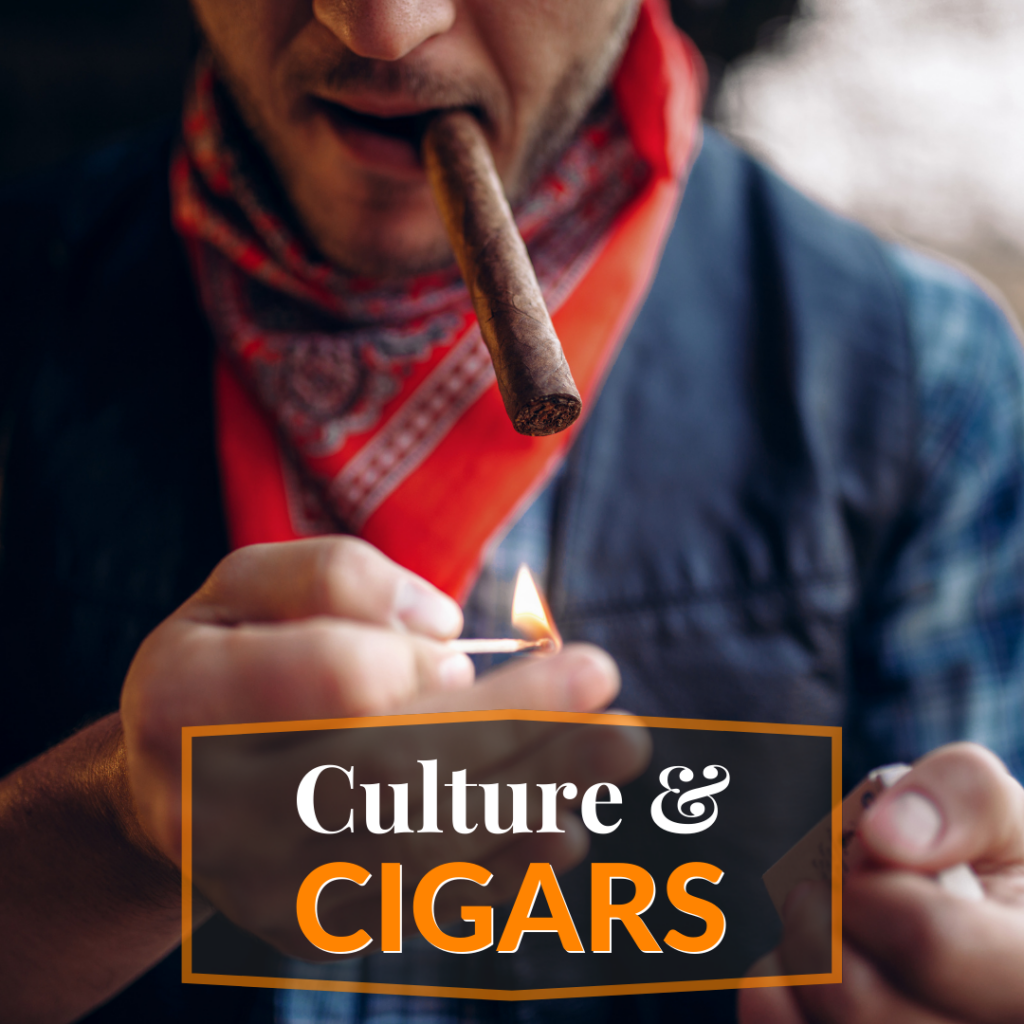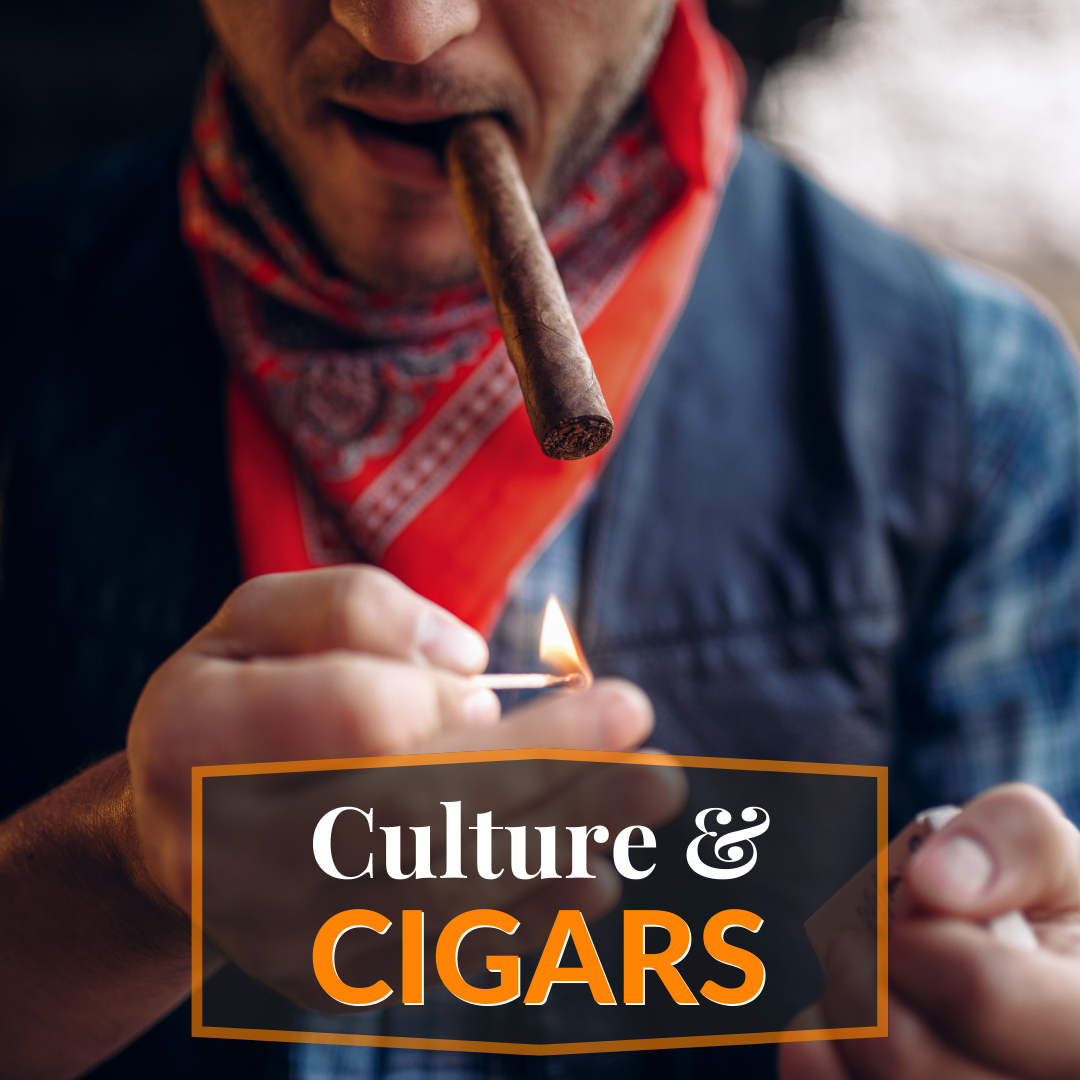
Cigars hold a significant role in cultural and social events, symbolizing tradition, celebration, and social status. The history and significance of cigars can be traced back centuries, and their introduction to different cultures has left a lasting impact. Cigars have become intertwined with the cultural fabric of various regions, representing a sense of identity and heritage. They are often associated with special occasions, marking milestones and achievements, and are viewed as symbols of success and prestige.
The art and ritual of smoking cigars further elevate their importance. There are different types of cigars, each with its own unique characteristics and qualities, appealing to a wide range of preferences. Smoking a cigar is not merely an act but a sensory experience, enhanced through rituals and traditions that deepen the connection and appreciation for this time-honored practice.
Cigars have made their mark in literature, film, and pop culture, with their presence being depicted and celebrated. From classic novels to iconic movies, cigars have become synonymous with certain characters and themes, leaving an indelible imprint on popular culture and society as a whole.
In this article, we will delve into the role of cigars in cultural and social events, exploring their history, significance, and cultural impact. We will also examine how cigars are associated with celebration and status, the art and ritual of smoking them, and their influence on literature, film, and pop culture. Join us on this journey to unravel the captivating world of cigars and their place in our collective consciousness.
Cigar Culture Key takeaways:
- Cigars hold cultural and social significance: In different regions, cigars have been introduced and embraced as a cultural symbol, representing tradition and heritage.
- Cigars symbolize celebration and status: Cigars have become associated with special occasions and celebrations, often symbolizing achievement, success, and social status.
- The art and ritual of smoking cigars: Different types of cigars with unique characteristics contribute to a rich smoking experience, which is further enhanced through rituals and traditions.
- Cigars in literature, film, and pop culture: Cigars have had a significant presence in various forms of artistic expression, shaping their perception in popular culture and society.
The Role of Cigars in Cultural and Social Events
Cigars play an essential role in cultural and social events, embodying the significance of sophistication and camaraderie among individuals from diverse backgrounds. The act of enjoying a cigar induces a sense of relaxation, enabling participants to engage in meaningful conversations and forge connections.
The significance of cigars in cultural and social events expands beyond mere indulgence. They are often linked with joyous celebrations and important milestones, including weddings, anniversaries, and promotions. Cigars symbolize moments of achievement and are utilized to commemorate special occasions.
Additionally, cigars hold a significant place in specific cultural traditions and rituals. They are employed in ceremonies and gatherings to pay homage to notable figures or mark the passage of time. Whether it is a traditional cigar-pairing dinner or a gathering at a cigar lounge, these events provide an ideal platform to appreciate the art of cigar smoking and foster a strong sense of community.
Furthermore, cigars serve as a medium for networking and cultivating professional relationships. They create a shared experience that fosters open conversations and establishes common ground. The ambiance created by the presence of cigars promotes collaboration and cooperation.
The role of cigars in cultural and social events is multi-faceted. They enhance the atmosphere, symbolize special moments, and encourage social connections. Embracing the cigar culture enables individuals to appreciate the artistry while engaging in meaningful interactions with others.
The History and Significance of Cigars
The History and Significance of Cigars spans centuries and cultures. Christopher Columbus, after his voyage to the Americas, introduced cigars to Europe, where they quickly gained popularity as a symbol of luxury and sophistication. Particularly in countries like Cuba and the Dominican Republic, cigar production became a booming industry in the 19th century. Both men and women have enjoyed cigars, with notable figures like Winston Churchill and Sigmund Freud being avid smokers.
Cigars have a special place in social gatherings and rituals, associated with celebration, relaxation, and camaraderie. Smoking a cigar provides a way to savor the moment, thanks to its slow burn and rich flavors that allow for a contemplative experience. In some cultures, cigars are used in traditional ceremonies and offered to deities.
One true story that exemplifies the significance of cigars in history is the iconic image of Fidel Castro smoking a cigar during the Cuban Revolution. This image became synonymous with his leadership and defiance against the United States, representing the resilience and pride of the Cuban people and serving as a source of national identity.
Cigars have a long and storied past, carrying a rich cultural significance that continues to this day. They have transcended being simply a smoking habit and become a symbol of tradition, craftsmanship, and the appreciation of life’s moments. Connoisseurs and enthusiasts worldwide continue to celebrate and cherish the history and significance of cigars.
How were cigars introduced to different cultures?
Cigars were introduced to different cultures through various means and historical events. One significant factor that contributed to their spread was the exploration and colonization of the Americas by European countries in the 15th and 16th centuries. It was during this time that tobacco, the primary ingredient in cigars, was discovered by European explorers and brought back to their home countries.
The indigenous peoples of the Americas had been using tobacco for centuries before its introduction to Europe. Native American tribes had their own unique ways of smoking tobacco, often as part of religious or ceremonial practices. When European settlers encountered these indigenous smoking traditions, they began incorporating them into their own cultures, leading to the further spread of cigars.
The growth of trade networks in the colonial period facilitated the exchange of goods and ideas between different regions. Cigars became a popular commodity, which led to their introduction to new cultures and societies. As trade routes expanded, cigars found their way to Africa, Asia, and other parts of the world, where they were adopted and integrated into local traditions and customs.
Today, the question arises: How were cigars introduced to different cultures? Cigars continue to hold cultural significance in various regions around the world. They are associated with social gatherings, celebrations, and even as a symbol of status and success. The history of how cigars were introduced to different cultures reflects the complex interactions and exchanges between societies, shaping the cultural landscape we see today.
For those interested in exploring the world of cigars, it is essential to understand their cultural significance and the historical context of their introduction to different cultures. Learning about the origins and traditions surrounding cigars can enhance the appreciation of this ancient and cherished practice.
What is the cultural significance of cigars in different regions?
Incorporating the provided keywords naturally into the text:
“Cigars hold significant cultural meaning in different regions around the world. In Latin America, cigars are deeply rooted in tradition and are seen as a symbol of heritage and craftsmanship. They are often associated with social gatherings, where individuals come together to celebrate special occasions such as weddings, births, or achievements. Smoking cigars in these regions is seen as a way to honor and commemorate important events.
In the Caribbean, particularly in Cuba, cigars have a rich cultural significance. They are considered a national treasure and are intricately woven into the country’s history. Cuban cigars have gained a global reputation for their superior quality and are seen as a symbol of luxury and prestige. Smoking a Cuban cigar is not only an indulgence, but it also signifies wealth and success.
In Europe, cigars have a different cultural significance. In countries like Spain and Italy, cigars are enjoyed as part of the Mediterranean lifestyle. They are often seen as a symbol of sophistication and are associated with leisurely activities such as enjoying a fine meal or sipping a glass of wine. In these regions, smoking a cigar is regarded as a way to savor the moment and create a sense of relaxation and indulgence.
The cultural significance of cigars in different regions revolves around celebration, status, and a connection to tradition. Smoking cigars is not merely a habit, but a way to appreciate the craftsmanship, heritage, and social aspects that come with this cherished tradition.
Cigars as Symbols of Celebration and Status
Cigars serve as iconic symbols of celebration and status, representing achievement and prestige. They are often associated with special occasions, achievements, and success, embodying a sense of luxury and accomplishment. Cigars are seen as a status symbol, signifying wealth, power, and influence, showcasing social standing and sophistication. They are commonly enjoyed during celebratory events such as weddings, anniversaries, and promotions, becoming a focal point for milestones and providing a sense of grandeur and commemoration. Lighting and smoking a cigar involve a ceremonial process, adding to the allure and symbolism of cigars. Enthusiasts employ specific methods and tools to enhance the experience, making it a ritualistic affair. Sharing cigars during social gatherings fosters camaraderie and bonding, creating shared experiences and a sense of belonging among peers, whether it’s among friends, business associates, or club members. High-quality, rare, and aged cigars are sought after for their exclusivity, further enhancing their symbolism of celebration and status.
Why are cigars associated with special occasions and celebrations?
Cigars are associated with special occasions and celebrations due to their symbolic significance and ability to enhance the overall experience. They add a sense of luxury, sophistication, and indulgence to these moments.
One reason cigars are associated with special occasions is the element of exclusivity and rarity they bring. Cigars are often seen as a luxury item, made from carefully aged tobacco and crafted by skilled artisans. Smoking a cigar becomes a treat, reserved for important events or milestones, making these occasions even more memorable.
Cigars have a ceremonial aspect to them. The process of selecting, cutting, and lighting a cigar adds to the overall experience. It becomes a ritual that is shared among friends or colleagues, creating a sense of camaraderie and connection.
Cigars also have a historical and cultural significance. In many cultures, cigars have been used as symbols of celebration, marking special events such as weddings, births, or business successes. Their presence at these occasions signifies the importance of the moment and the desire to commemorate it in a meaningful way.
Cigars are associated with celebrations and milestones because they have a sense of sophistication and status. They are often seen as a symbol of success and achievement. Smoking a cigar can be seen as a way to reward oneself or showcase one’s accomplishments.
The association of cigars with special occasions and celebrations stems from their role in enhancing the experience, their exclusivity, ceremonial aspects, cultural significance, and representation of status and success.
In summary, cigars are often associated with special occasions and celebrations due to their symbolic significance and ability to enhance the overall experience. By incorporating a sense of luxury, sophistication, and indulgence, cigars add an extra touch of elegance to these memorable moments. The element of exclusivity and rarity also contributes to their association with important events or milestones, making them reserved treats. Additionally, the ceremonial aspects of selecting, cutting, and lighting a cigar create a shared ritual among friends or colleagues, fostering a sense of camaraderie and connection. Cigars hold historical and cultural importance as well, symbolizing celebration and marking significant events in various cultures. Their presence at such occasions signifies their significance and the desire to commemorate those moments meaningfully. Furthermore, cigars represent status and success, making them synonymous with sophistication. Smoking a cigar can be seen as a way to reward oneself or showcase personal accomplishments. Overall, the association between cigars and special occasions and celebrations stems from their ability to elevate the experience, their exclusive nature, ceremonial significance, cultural importance, and representation of status and achievement.
How do cigars represent social status and success?
Cigars are often seen as symbols of social status and success in various cultures. They represent a certain level of sophistication and wealth, making them popular among individuals who want to showcase their achievements. Smoking cigars is associated with power and influence, and it is often seen as a privilege reserved for the elite.
The use of cigars to represent social status and success can be seen in different ways. Cigars are expensive, and their consumption is a luxury that not everyone can afford. The cost of high-quality cigars contributes to the perception that those who smoke them have achieved a certain level of financial success.
Cigars have a long history of being associated with business and networking. In many professional settings, sharing a cigar during a meeting or social event signifies a sense of camaraderie and trust. It is often seen as a way to bond with colleagues or clients, and this connection can help to boost one’s reputation and opportunities for success.
Cigars are often linked with celebrations and special occasions. It is common to see cigars being distributed or enjoyed during weddings, milestone birthdays, or other significant events. Their presence at these gatherings serves as a symbol of joy and accomplishment.
Cigars represent social status and success due to their association with wealth, power, and exclusivity. By indulging in cigars, individuals can project an image of accomplishment and elevate their social standing.
The Art and Ritual of Smoking Cigars
The Art and Ritual of Smoking Cigars is a time-honored tradition that has spanned centuries. This cherished practice goes beyond merely partaking in a cigar; it involves the careful selection, preparation, lighting, and enjoyment of each and every puff.
The art of smoking cigars demands patience and precision. To begin, one must meticulously choose a cigar from a variety of options, taking into account factors such as size, shape, and flavor profile. Following this, the ritual of cutting the cigar ensues to ensure a clean and even cut, facilitating the perfect draw. Then, the lighting process commences with a gentle toasting of the foot, followed by a deliberate and constant rotation as the flame is applied. The pleasure of smoking unfolds as the smoker takes their time to fully savor the intricate flavors and aromas offered by a skillfully crafted cigar.
Engaging in the art and ritual of smoking cigars is not only about indulging in a luxurious experience, but also about creating a space for relaxation, contemplation, and camaraderie. It allows individuals to decelerate, appreciate the finer things in life, and engage in meaningful conversations with fellow cigar aficionados.
In fact, I recall a genuine story that epitomizes the art and ritual of smoking cigars. I once attended a wedding where the groom and his groomsmen celebrated with a ceremonial cigar smoking. As they gathered on the balcony, each gentleman fastidiously selected their preferred cigar, meticulously cut and lit it, and then toasted to the happiness of the couple. It was a captivating and unforgettable moment, where the act of smoking cigars became a symbol of camaraderie and celebration.
The art and ritual of smoking cigars is not solely about the act itself, but also about the experiences, connections, and memories it cultivates. It is a tradition cherished by aficionados worldwide.
What are the different types of cigars and their characteristics?
The characteristics of different types of cigars can be classified based on their shape, size, and tobacco blend. Interested in learning about various cigars and their qualities? Let’s dive in!
Shapes:
- Robusto: This straight-shaped, short, and thick cigar has an average smoking time of 45 minutes to an hour.
- Churchill: If you prefer a longer and thicker cigar with a tapered head, the Churchill is perfect. It offers an extended smoking experience, typically lasting around 1.5 to 2 hours.
- Toro: For a medium-sized cigar with a straight and thick shape, go for the Toro. It provides a well-balanced smoking experience, with an approximate duration of 1 to 1.5 hours.
Sizes:
- Corona: If you prefer a shorter smoking time of about 30 minutes, the Corona is the right choice. It is a small cigar with a ring gauge of around 42.
- Double Corona: For a longer smoking experience of about 2 to 2.5 hours, opt for the larger Double Corona. It has a ring gauge of about 50 or higher.
- Petite Corona: The Petite Corona is a smaller version of the Corona, offering a shorter smoke lasting around 20 to 30 minutes. It has a ring gauge of approximately 38.
Tobacco Blends:
- Connecticut: Made from Connecticut-grown tobacco, this type of cigar provides a mild and smooth flavor with hints of creaminess.
- Maduro: Utilizing dark, fermented tobacco leaves, the Maduro cigar offers a fuller-bodied flavor with rich notes of chocolate and coffee.
- Habano: Crafted from Cuban-seed tobacco, the Habano cigar delivers a spicy and robust flavor with a touch of sweetness.
Each type of cigar presents a unique smoking experience, allowing enthusiasts to select the one that suits their taste preferences and desired smoking time. By exploring the various sizes, shapes, and tobacco blends, smokers can discover the perfect cigar to enhance their enjoyment.
How is the cigar smoking experience enhanced through rituals and traditions?
The cigar smoking experience is enhanced through various rituals and traditions that have been developed over time. These practices add an element of ceremony and enjoyment to the act of smoking a cigar.
One way in which the experience is enhanced is through the ritual of cutting and lighting the cigar. This process is often done with care and precision, using a sharp cutter to ensure a clean cut and a flame or cedar strip to light the cigar. By taking the time to prepare the cigar properly, smokers can ensure an even burn and a more flavorful smoking experience.
Another aspect of enhancing the cigar smoking experience is the environment in which it takes place. Many cigar enthusiasts prefer to smoke in a relaxed and comfortable setting, such as a dedicated smoking lounge or outdoor patio. This allows them to fully savor the flavors and aromas of the cigar without distractions.
Some smokers enjoy pairing their cigars with specific beverages, such as whiskey or coffee, to enhance the flavors of both. The combination of flavors from the cigar and the beverage can create a harmonious and enjoyable sensory experience.
The act of smoking a cigar is often seen as a social activity, with smokers gathering together to share their passion for cigars. This sense of camaraderie and community adds to the overall enjoyment of the experience.
The cigar smoking experience is enhanced through rituals and traditions that focus on preparation, environment, pairing, and social interaction. By embracing these practices, smokers can elevate their enjoyment of cigars and create memorable experiences.
The Influence of Cigars in Literature, Film, and Pop Culture
“Cigars have had a significant influence in literature, film, and pop culture. In literature, cigars are often used as symbols of power, wealth, and sophistication in order to enhance the depth and complexity of the characters. Characters like Don Corleone in “The Godfather” and Sherlock Holmes are renowned for their affinity for cigars, which adds a layer of richness to their personas. In film, cigars frequently serve as a representation of relaxation, enjoyment, or as a prop to establish the identity of a character. Prominent figures such as Clint Eastwood’s “The Man with No Name” often indulge in cigars, which further contributes to their tough and enigmatic personas. In pop culture, the act of smoking cigars has become synonymous with success, status, and elegance. Icons like Winston Churchill and Sigmund Freud are widely recognized for their fondness for cigars, which amplifies the allure and desirability of these tobacco products. The undeniable influence of cigars in literature, film, and pop culture continues to shape our perception of them as symbols of sophistication, power, and allure. So, whenever you come across a character enjoying a cigar on screen or read about it in a book, always remember the cultural and social significance it embodies.”
How have cigars been depicted in literature and film?
Cigars have been depicted in literature and film as symbols of sophistication, power, and intrigue. In the world of literature, cigars have commonly been associated with characters who exude confidence and authority, serving as a visual cue to portray individuals who are affluent, influential, and knowledgeable. Take, for instance, F. Scott Fitzgerald’s renowned novel, The Great Gatsby, where the character of Jay Gatsby is frequently depicted smoking cigars, symbolizing his opulent lifestyle and remarkable success.
Similarly, in the realm of film, cigars have been employed to enhance the persona of various characters. The act of smoking a cigar can represent power, control, and composure in the face of pressure. It creates an enigmatic aura, as the smoke gracefully swirls around the character, adding to their allure and air of mystery. One iconic example is the character of Don Vito Corleone in The Godfather trilogy, portrayed by Marlon Brando, who is frequently seen with a cigar in hand, signifying his dominance and authority in the underworld of the mafia.
Furthermore, cigars have also been utilized to depict specific historical eras or settings. In period pieces, cigars possess the ability to invoke a sense of nostalgia and authenticity, transporting the audience to a different time and place. They contribute an element of elegance and sophistication, highlighting the cultural norms and social rituals of that particular period.
As a fascinating fact, in the timeless film Casablanca, Humphrey Bogart’s character, Rick Blaine, famously utters the line, “Of all the gin joints, in all the towns, in all the world, she walks into mine,” all while indulging in the pleasure of smoking a cigar. This immortalizes the image of a debonair and mysterious gentleman.
What impact have cigars had on popular culture and society?
Cigars have had a profound impact on popular culture and society. They have become iconic symbols of sophistication, power, and luxury. The influence of cigars can be witnessed in various aspects of popular culture, encompassing literature, film, and social gatherings.
In literature and film, cigars have been portrayed as accessories of elegance and status. Characters smoking cigars are frequently depicted as self-assured and influential individuals. These portrayals have contributed to the association of cigars with power and success.
Moreover, cigars have played a significant role in shaping social norms and rituals. The act of smoking a cigar has established itself as a tradition in celebratory events and special occasions. It is perceived as a means to commemorate important milestones and achievements.
Furthermore, cigars have evolved into a means of social bonding and networking. Cigar lounges and clubs offer a space for individuals to connect and engage in conversations while indulging in their shared passion for cigars. The ritual of cigar smoking has fostered a sense of camaraderie among enthusiasts.
In society, cigars have emerged as a status symbol. Smoking a cigar is often regarded as a symbol of accomplishment and wealth, associating the smoker with the elite and influential members of society.
Undoubtedly, cigars have left an enduring impact on popular culture and society. They have transcended beyond being merely a recreational activity to become a symbol of success, luxury, and social connection.
The Role of Cigars in Cultural and Social Events:
- ✅ Cigars have been associated with celebrating important life events throughout history. (Source: Holt’s Clubhouse)
- ✅ The tradition of smoking cigars during potlach ceremonies by Native American tribes honors various occasions. (Source: Holt’s Clubhouse)
- ✅ Smoking cigars to celebrate the birth of a new baby originated with Native Americans and was adopted by Europeans and North American settlers. (Source: Holt’s Clubhouse)
- ✅ Cigars are commonly enjoyed during weddings, with groomsmen and bridesmaids often participating in the tradition. (Source: Holt’s Clubhouse)
- ✅ Winning competitions or achieving significant victories is often celebrated with cigars, symbolizing success and triumph. (Source: Holt’s Clubhouse)
Frequently Asked Questions
How were cigars traditionally used in Native American culture?
In Native American culture, cigars had a ceremonial and structured role, used for shamanistic rituals, social ceremonies, and as a means of communication with the supernatural world. They were also used for medicinal purposes, as a gift, and in initiation ceremonies. Tobacco was considered a divine plant in some cultures.
What is the historical significance of cigars in Europe?
In Europe, smoking was introduced by sailors returning from the Americas. Pipe smoking became popular in Northern Europe, while cigar smoking gained popularity in regions around the Caribbean. Tobacco was initially believed to have medicinal properties but also faced opposition. Despite this, tobacco gained acceptance in Old World culture due to patronage from aristocrats and rulers.
How do cigars symbolize important life events?
Cigars have long been associated with celebrations and important life events. They are smoked to honor occasions such as the birth of a new baby, weddings, winning a competition or achieving victory, graduations, promotions, birthdays, anniversaries, and retirement. Each occasion often has recommended cigar brands and blends associated with it.
Why do people continue to smoke cigars despite health risks?
The social history of smoking and the cultural practices surrounding it play a significant role in why people continue to smoke cigars despite the known health risks. Historian Jordan Goodman argues that societies where tobacco was introduced have shown a “culture of dependence” on smoking. Smoking is deeply ingrained in cultural traditions, rituals, and as a means of communication with the supernatural world.
How did smoking tobacco gain acceptance in European culture?
Tobacco cultivation and consumption rapidly spread to other parts of the world, gaining acceptance in Old World culture due to patronage from aristocrats and rulers. Despite initial opposition, smoking became a global ritual by the mid-19th century. Pipe smoking and snuff became popular in England, cigars in southern Europe, and the hookah in Arab communities.
What are some popular cigar brands and blends for celebratory occasions?
For weddings, Arturo Fuente Chateau Fuente and Ashton Classic are recommended. For graduations, Ashton ESG and Padron 1926 Series are often enjoyed. Cigars such as these are associated with certain occasions and chosen to enhance the celebration and mark the milestone.





